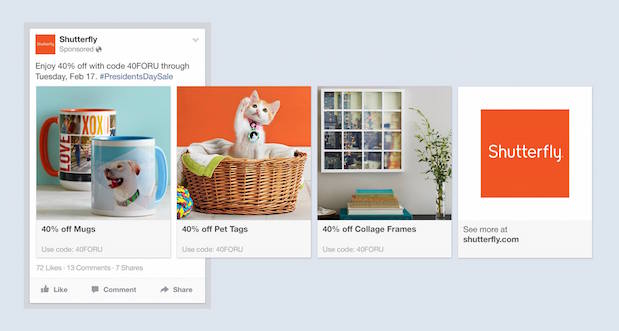Secure your place at the Digiday Media Buying Summit in Nashville, March 2-4

The free ride is over on Facebook.
Last November, Facebook said that it was changing the news feed algorithm to limit distribution on posts it deemed “feel too promotional.” Now, surprise, Facebook has a new ad format that allows retailers to distribute exactly those kinds of promotional posts. The change is the latest in a series of steps the platform has taken to cut off organic reach of what are in effect ads.
“For news feed, there’s a percentage of posts that are going to be from your friends, that are news, that are entertainment and that are from brands,”Jason Stein, president of digital agency Laundry Service, told Digiday. “What Facebook is trying to say is that almost all the posts you see from brands should be paid for, whereas the entertainment and news should be organic.”
The new ads, dubbed product ads, are self-explanatory: They’re designed to help retailers and brands promote and sell specific products through Facebook’s news feed. Retailers can also use them to retarget users who previously visited their websites; look at a shoe on an e-commerce website, and you might see an ad for that pair next time you open Facebook.
A blog post about the announcement included an example of photo delivery service Shutterfly using the new ad. The ad includes the copy “Enjoy 40% off with the code 40FORU through Tuesday, Feb. 17. #PresidentsDaySale.”

When Facebook announced it would throttle overly promotional posts last November, it said posts that “solely push people to buy a product” would see a decrease in distribution. The announcement included a hypothetical example of an overly promotional post with copy that read “Only 15 minutes left to get your Bunny Bucks for 53% off!”

Facebook said that the decision to crack down on overly promotional posts was precipitated by user complaints. Facebook’s chief product officer, Chris Cox, maintained a similar position yesterday at Recode’s Code Media, where he said that Facebook does not “dial down” certain posts. Rather, Facebook’s users have their collective hand on the dial; their clicks and likes determine how certain kinds of posts are featured in news feed.
Some worried last November that Facebook, instead of letting its users decide what posts were and were not worth seeing, had become an arbiter of taste.
So, FB is cracking down on “overly promotional” posts. Who draws the line? “Overly” may be just right for some.
— Debra Aho Williamson (@DebraWilliamson) November 17, 2014
And many small business owners bemoaned the change, saying that they relied on supposedly overly promotional posts to drive sales, according to a report in The Wall Street Journal.
Yory Wurmser, retail analyst at eMarketer, said that while the new ads are not a “one-to-one replacement” for promotional posts, the two are not entirely separate, either.
“Within the big picture, Facebook has substantially reduced reach on brand posts,” he told Digiday.
Stein added that while organic reach on promotional posts, as with all posts, is trending toward zero, organic reach still plays in a vital role on Facebook in that it extends the reach of paid posts. Advertisers see a lower CPM on paid posts that users share with their friends, he said.
So brands can still annoy users with promotional product posts, they now just have to pay Facebook to do so.
Homepage image courtesy Getty Images
More in Media

Media Briefing: Turning scraped content into paid assets — Amazon and Microsoft build AI marketplaces
Amazon plans an AI content marketplace to join Microsoft’s efforts and pay publishers — but it relies on AI com stop scraping for free.

Overheard at the Digiday AI Marketing Strategies event
Marketers, brands, and tech companies chat in-person at Digiday’s AI Marketing Strategies event about internal friction, how best to use AI tools, and more.

Digiday+ Research: Dow Jones, Business Insider and other publishers on AI-driven search
This report explores how publishers are navigating search as AI reshapes how people access information and how publishers monetize content.





